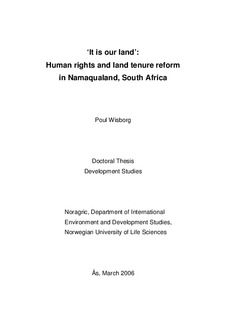It is our land. Human rights and land tenure reform in Namaqualand, South Africa
Doctoral thesis
Permanent lenke
http://hdl.handle.net/11250/187695Utgivelsesdato
2006-03Metadata
Vis full innførselSamlinger
Sammendrag
‘It is our land’: Human rights and land tenure reform in Namaqualand, South Africa
Secure access to resources is a universal condition of human well-being and is of
considerable concern in contemporary human rights discourse, though often neglected in policy and practice. In this respect the South African constitutional guarantees and policies concerning land reform are of wide interest. The main goal of this study is to contribute to the
theoretical and empirical understanding of land tenure as a human rights issue. The study (i) reviews human rights that affect land tenure; (ii) develops a theoretical approach to rights, institutions and human capabilities; (iii) analyses recent South African land tenure policy and (iv) documents and analyses a phase in the implementation of the Transformation of Certain Rural Areas Act, Act 94 of 1998 (Trancraa) in Namaqualand, Northern Cape Province during 2001 and 2002. Trancraa provides for land tenure reform in state-claimed rural areas, formerly ‘coloured reserves’, by returning ownership rights to residents or local institutions through a consultative process. It is the first comprehensive post-apartheid land tenure
reform in state-claimed, communal lands. Trancraa emphasised the protection of land rights and local government accountability to land users, but did not address rights to gender equality, the constitutional and human right to redress, or wider economic rights. Trancraa was implemented through the networking action of civil society organisations, communitybased
Transformation Committees, local municipalities and state officials. The study
documents the implementation in two Rural Areas, Pella and Komaggas. In Pella the
consultation involved debates, studies, advocacy and community referenda on land
ownership. The Transformation Committee defended and promoted some of interests in land and development within a pragmatic engagement with civil society and government. Claiming that it is our land reflected histories and discourses of community tenure but could also
conceal conflicts and claims by different groups, such as enterprising farmers or leaders. In Komaggas, the Trancraa process was resisted by a community group that saw the Act as unduly assuming state ownership of land and the process as promoting the interests and power of a new municipality. In both sites, residents’ diverse claims that it is our land made
political claims for justice and development. However, the state’s offer that it is your land changed over time, particularly affected by policies and discourses of market-based development and increasingly appearing as ‘an opportunity for the state to bail out’. Limited
guarantees of public support for the proposed new land holding organisations created uncertainty, so that Trancraa also displayed risks that the process would become a ‘democratisation of disempowerment’, characterised by debates, studies and drafting of rules
rather than material and institutional change. The process illustrates the diverse normative relevance and possible empirical role of human rights. The study suggests that a social order in which human rights are respected will remove some sources of tenure insecurity, such as racial and gender discrimination; that rights to information, political participation and nondiscrimination
are important to enable a fair and effective land reform; and that secure land
tenure contribute to the realisation of human rights such as rights to livelihood, work and substantial equality. The empirical role of human rights depends on many actors, processes and contextual factors, as the efforts by Trancraa committees and facilitators to promote land
projects and human capabilities demonstrated. Human rights have made collective guarantees about supporting such struggles for human capabilities and social transformation, as also promised in South African land policy, hinted at in name of the ‘Transformation of Certain Rural Areas Act’ and claimed by residents with their assertion that it is our land.
